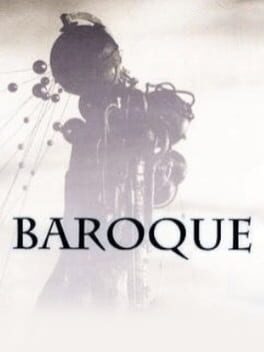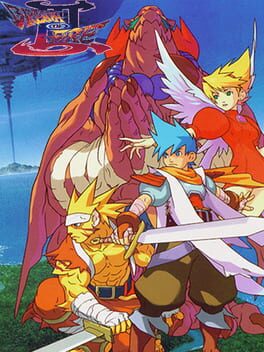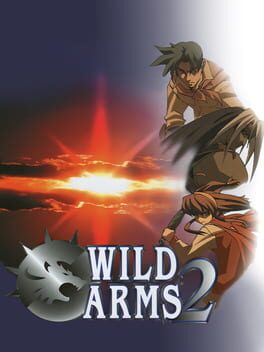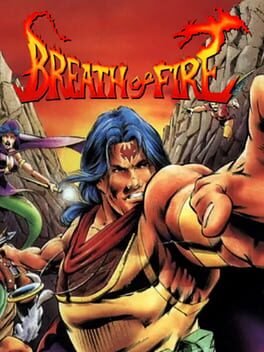DavisZachary1225
1998
I honestly cannot put into words what itch this game scratched - I've never played anything quite like it and, like a few other people said, I finished this game in two long bursts because I just couldn't possibly put it down. That time was full of "just one more floor," as "one more floor" turned into finishing the run, then into "just one more run", and the cycle repeats. The action is complex yet rewarding, with each enemy having a particular moveset that you can learn - it feels incredible weaving around and avoiding all damage because you've learned how the Grotesques move and attack, manipulating enemies into killing each other, and using these skills (and a great deal of luck) to finally make it to the bottom for the first time.
Plot is obtuse, progressing based on vaguely defined puzzles, experimentation, and death; you never quite know what's going on, but that mystery adds to the barren, dingy, and dark atmosphere.
Plot is obtuse, progressing based on vaguely defined puzzles, experimentation, and death; you never quite know what's going on, but that mystery adds to the barren, dingy, and dark atmosphere.
1997
This review contains spoilers
A very strong first half and several very strong mechanics dragged down by a poor translation and a messy second half.
- Positives: Skill system and Dragon Genes make battle very customizable; worldbuilding and exposition of the first half are very strong; field abilities are always a fun addition in my opinion
- Negatives: Second half loses focus very quickly, with no real antagonist until the last second and confusing, vague directions (occasionally mistranslated to the point where they aren't directions); field abilities lead player toward "optimal" party that happens to also be the most effective in combat, making the other party members feel pointless at best and annoying at worst when you fight through countless random battles to get to an area that you need to progress through but don't have the correct party for (requiring the player to run to the exit and reorganize).
The end of the game also comes very quickly after the most tedious, glaringly mistranslated, and annoying part of the game (the Desert of Death).
I just wish the game had done more to foreshadow Teepo, though I do appreciate the way he was used. I would have dropped hints throughout the adult segment that a few people have sighted another dragon, though nobody knows where it's heading or who it is; don't let the player know who it is until the end, but give some intrigue, because when he just appears without any warning it feels like the devs just ran out of time (though they very well could have)
- Positives: Skill system and Dragon Genes make battle very customizable; worldbuilding and exposition of the first half are very strong; field abilities are always a fun addition in my opinion
- Negatives: Second half loses focus very quickly, with no real antagonist until the last second and confusing, vague directions (occasionally mistranslated to the point where they aren't directions); field abilities lead player toward "optimal" party that happens to also be the most effective in combat, making the other party members feel pointless at best and annoying at worst when you fight through countless random battles to get to an area that you need to progress through but don't have the correct party for (requiring the player to run to the exit and reorganize).
The end of the game also comes very quickly after the most tedious, glaringly mistranslated, and annoying part of the game (the Desert of Death).
I just wish the game had done more to foreshadow Teepo, though I do appreciate the way he was used. I would have dropped hints throughout the adult segment that a few people have sighted another dragon, though nobody knows where it's heading or who it is; don't let the player know who it is until the end, but give some intrigue, because when he just appears without any warning it feels like the devs just ran out of time (though they very well could have)
1999
This review contains spoilers
Everything positive about the first game, with a lot more. Environments are fairly typical for RPGs of the era, as is the writing (with a few very strange choices, like implied incest) and the translation (that led a lot of North American fans to believe one of the protagonists is gay). What was fairly unique for the era was the tone - the world you live in is dying, and there's not really anything to be done beyond living life; people suffer, tragedies happen, and "heroes" are an ideal that nobody should strive for.
A huge portion of the plot focuses on the nature of heroism and self-sacrifice. The plot begins with Ashley, a young man who dreams of being a hero; Lilka, a young woman who wants to become as memorable and good as her older sister, a prodigy magician; and Brad, a veteran who is under pursuit as a fugitive for his role in a recent war (for which he earned the title of "hero" to some). After completing each character's prologue, Ashley quickly finds his destiny in ARMS, initially a military squadron designated to solving politically complicated problems but later a specialist anti-terrorist squad.
As the plot continues, Tim (the designated sacrifice of what is basically the druid village) and Kanon (a woman who has replaced her body with cybernetics to better become the "hero" to defeat an ancient and all-powerful evil) join the party and bring their unique skills to the table. Tim, in particular, is used to demonstrate the futility of sacrificing one's self for a cause - as the "Pillar", his "destiny" is to be sacrificed to commune with the Guardians (Filgaia's resident summon spirits); he politely but firmly refuses, instead deciding to find a new way forward with the rest of ARMS.
The issue with this theme as presented is that the final conflict is, in fact, solved by a character sacrificing himself and his loved ones for the sake of saving the world. While it is more complicated than that, it still feels a bit like it's ignoring what the game has been trying to hammer into the player until then.
Combat is a simple affair. The game gives the player the opportunity to skip weaker encounters, but so long as you don't overuse that in the dungeons you are exploring for the linear story, you won't need to grind (except to get the optional skills for Tim and Kanon). Only a few bosses present a reasonable challenge, though I could imagine a No-Tim run being a lot harder and a lot more fun. Magic is significantly more powerful than physical attacks, especially if the player uses Auto-Battle, where the AI will automatically use whatever the enemy is weak against which is an almost guaranteed OHKO. Instead of MP, the player has FP, which goes up as they take hits and use physical attacks - once they have the FP available to use a skill, it becomes available, and using regular skills does not cause FP to decrease. The FP you start with in battle is equal to your current level - making Lilka and Tim's power balancing a cliff rather than a slope. Tim will almost always move first, has the highest magic attack, and has access to every element, so when he's on auto-battle he will always kill at least one enemy before anything else happens. He also has the only free multi-target heal in the game (which, again, always goes off first and becomes more powerful as his magic skill increases). Again, I think a No-Tim run would be a decent challenge, but as is he kind of breaks the game.
Exploration is probably the most fun part of this game. The puzzles are (mostly) intuitive, with good use of field items and the rotatable camera. The downside is anything that requires a hint from the environment - like other games of the era, the translation makes deciphering those hints almost impossible in some places.
Warning: The final boss fight has your character using abilities that they've never had before in a basically unloseable 1-1 encounter. Taking off half a point for that alone because I want final boss fights to be an actual test of my skills.
Average game, but I would wholeheartedly recommend it to anyone looking to get into RPGs for the first time, because the game mostly conveys itself pretty well and it's an easy enough time.
A huge portion of the plot focuses on the nature of heroism and self-sacrifice. The plot begins with Ashley, a young man who dreams of being a hero; Lilka, a young woman who wants to become as memorable and good as her older sister, a prodigy magician; and Brad, a veteran who is under pursuit as a fugitive for his role in a recent war (for which he earned the title of "hero" to some). After completing each character's prologue, Ashley quickly finds his destiny in ARMS, initially a military squadron designated to solving politically complicated problems but later a specialist anti-terrorist squad.
As the plot continues, Tim (the designated sacrifice of what is basically the druid village) and Kanon (a woman who has replaced her body with cybernetics to better become the "hero" to defeat an ancient and all-powerful evil) join the party and bring their unique skills to the table. Tim, in particular, is used to demonstrate the futility of sacrificing one's self for a cause - as the "Pillar", his "destiny" is to be sacrificed to commune with the Guardians (Filgaia's resident summon spirits); he politely but firmly refuses, instead deciding to find a new way forward with the rest of ARMS.
The issue with this theme as presented is that the final conflict is, in fact, solved by a character sacrificing himself and his loved ones for the sake of saving the world. While it is more complicated than that, it still feels a bit like it's ignoring what the game has been trying to hammer into the player until then.
Combat is a simple affair. The game gives the player the opportunity to skip weaker encounters, but so long as you don't overuse that in the dungeons you are exploring for the linear story, you won't need to grind (except to get the optional skills for Tim and Kanon). Only a few bosses present a reasonable challenge, though I could imagine a No-Tim run being a lot harder and a lot more fun. Magic is significantly more powerful than physical attacks, especially if the player uses Auto-Battle, where the AI will automatically use whatever the enemy is weak against which is an almost guaranteed OHKO. Instead of MP, the player has FP, which goes up as they take hits and use physical attacks - once they have the FP available to use a skill, it becomes available, and using regular skills does not cause FP to decrease. The FP you start with in battle is equal to your current level - making Lilka and Tim's power balancing a cliff rather than a slope. Tim will almost always move first, has the highest magic attack, and has access to every element, so when he's on auto-battle he will always kill at least one enemy before anything else happens. He also has the only free multi-target heal in the game (which, again, always goes off first and becomes more powerful as his magic skill increases). Again, I think a No-Tim run would be a decent challenge, but as is he kind of breaks the game.
Exploration is probably the most fun part of this game. The puzzles are (mostly) intuitive, with good use of field items and the rotatable camera. The downside is anything that requires a hint from the environment - like other games of the era, the translation makes deciphering those hints almost impossible in some places.
Warning: The final boss fight has your character using abilities that they've never had before in a basically unloseable 1-1 encounter. Taking off half a point for that alone because I want final boss fights to be an actual test of my skills.
Average game, but I would wholeheartedly recommend it to anyone looking to get into RPGs for the first time, because the game mostly conveys itself pretty well and it's an easy enough time.
1993
This review contains spoilers
A painfully average start to a series that would get a lot better. The use of field abilities is a notable addition to the RPG genre, but those abilities are so situational that the ideal strategy is "Get new character, go around the world and collect all the bonus items before moving forward with plot".
Speaking of plot, there is very little to speak of. The game is an extended series of fetch quests, most heavily shown by the quest required to enter the final dungeon: ferrying letters back and forth to try to set two old people up, with no variation to each instance besides vague changes to already incomprehensible speech. The remainder of the game isn't much better, tasking the player with traveling across the world solving problems in each area in a linear order, with occasional detours to use new abilities. Most frustratingly, the game locks the player into the bad ending if they choose not to use a guide or guess at the locations of the protagonist Ryu's best equipment.
Speaking of plot, there is very little to speak of. The game is an extended series of fetch quests, most heavily shown by the quest required to enter the final dungeon: ferrying letters back and forth to try to set two old people up, with no variation to each instance besides vague changes to already incomprehensible speech. The remainder of the game isn't much better, tasking the player with traveling across the world solving problems in each area in a linear order, with occasional detours to use new abilities. Most frustratingly, the game locks the player into the bad ending if they choose not to use a guide or guess at the locations of the protagonist Ryu's best equipment.



